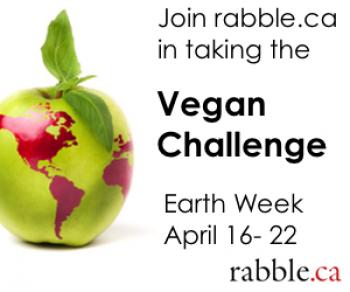This week, a number of rabble.ca staff and others are participating in a “Vegan Challenge” — one week of eating a vegan diet. Participants are blogging about the experience, and reflecting on the politics on our dinner plates. As a complement to the Vegan Challenge, this piece by Steffanie Pinch examines the history and evolution of veganism.
“I would totally go vegan,” one of my friends remarked casually the other day. “But it’s just too expensive.”
Her comment stung — not because, as a working class vegan myself, I know there is no way that it’s cheaper to eat animal products. It hurt because she was the third person I know to say this.
The stereotypical vegan has been burned into our collective subconscious: the pretentious, obnoxious, white, upper class vegan. The dude willing to spend twice the cost of cow’s cheese on imitation processed cheese slices.
Wait, when did being vegan rely on how much fake cheese you can afford?
It didn’t start out like this. Veganism began as a lifestyle adopted by many religions focused on minimizing harm. Many followers of Jainism, Hinduism and Buddhism have been practicing a vegetarian lifestyle as early as the 5th century BC. Vegetarian monks got by even after vowing to lead a life of poverty.
In the 1980s, vegans were fringe activists; straight-edge punks, non-violent squatters and folks fighting for animal rights. Food not Bombs began organizing free communal meals with food grocery stores would normally throw away. The first founding principle of the non-violent organization is that all meals need to always be free and always be vegan or vegetarian. Even with the food that others threw away, they made nutritious vegan meals.
Around the same time the People for the Ethical Treatment of Animals (PETA) was founded. PETA popularized the “go veg” message and began promoting veganism to the general public on a massive scale. Veganism was a tough sell in the early days — you needed to learn a new way to cook, research cruelty-free products and connect with a local vegan community. Being vegan was rooted in a DIY ethic, determined by passion instead of class standing.
That’s the hard part about being vegan. It makes you look for a connection between your life and that of an animal. Veganism means unlearning mainstream assumptions about humane slaughter, animal intelligence and our impact on the environment. Veganism is a complex personal political action. And that just doesn’t sell.
Diets sell. As North Americans fell into yet another fad diet craze in the early 2000s, veganism started getting all kinds of commercial endorsements. Small name-brand vegan substitutes like Daiya Cheese, Earth Balance and Tofurky were all of a sudden being recommended to the masses by Oprah and the authors of Skinny Bitch.
Seeing the commercial value in the vegan movement, corporations have been quick to bank in on veganism as solely a plant-based diet. PETA and other animal rights groups have latched on to the new mainstream popularity of the vegan health craze, despite its reliance on processed foods.
Nutritional yeast, textured vegetable protein and tofu are all great sources of protein outside of what’s already found in legumes and vegetables. But these cheap bulk alternatives aren’t touted by Dr. Oz. Instead, more expensive meat substitutes are the popular way to go. You never need to learn how to cook wholesome vegan food but you sure are getting sold on the idea, nuggets and all.
Commercialization has made veganism easier than ever (for upper class folks). Instead of eating frozen chicken nuggets, eat these frozen soy nuggets. The only catch is, of course, that as trendy health food, vegetarian processed substitutes now cost more than the actual products they’re competing against. Eating fake meat isn’t just missing the point — it’s more expensive than eating animals.
Even when the price of meat is kept unnaturally low by factory farming and subsidies, it generally understood that meat is still more expensive than in season, whole vegetables. It’s the access to this food and the knowledge of how to prepare them that’s missing in most poor/working class communities. The emphasis of giant vegan organizations keeps moving further away from sharing knowledge and skills to “go veg” — as quickly and seamlessly as possible.
Though convenient, the proliferation of these ready-made foods in combination with the popular understanding of veganism as a diet instead of a political action has robbed people of their power. The perception that veganism is only accessible to those who can afford it is actually damaging the movement and creating class barriers by fracturing the movements.
Veganism is like any other political action. It’s hard. You have to be committed and creative. The only thing veganism has cost me is my ignorance.
Steffanie Pinch is the Activist Toolkit Coordinator for rabble.ca.



